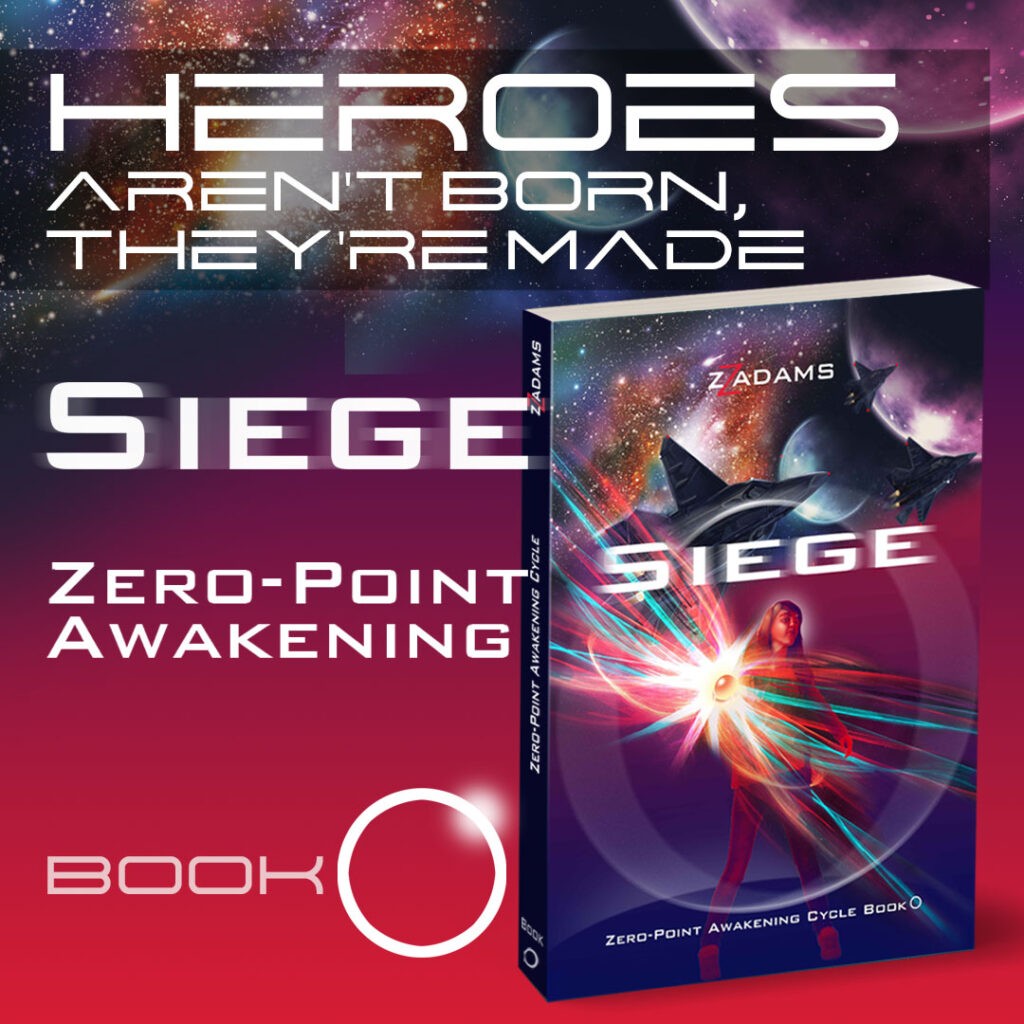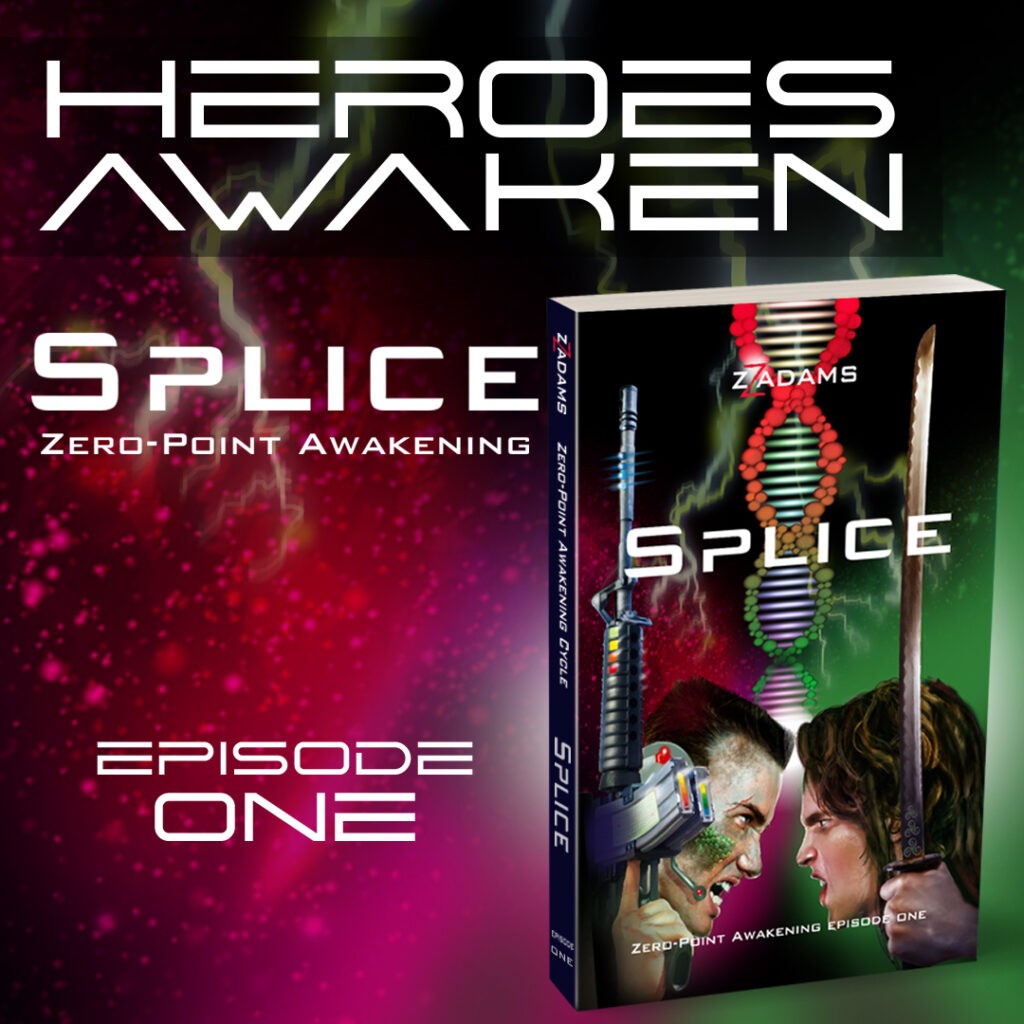So I just completed a book. Rather, four books and am currently working on the fifth in the series. All of these were written since July 2020. Brand new books. In addition, I wrote a reader magnet–an entire free prequel to the series that I and my co-author are giving away for free (more on that below) So by my reckoning, that works out to more than a book a month. That’s a lot of books.
For those needing some proof, here’s a link to Book One, SPLICE: Zero-Point Awakening Episode One.
So how did I write so much so quickly?
That’s simple. I didn’t. All of these books were written by ZZ Adams. These are all co-authored by my writing partner, Damian J. Clay and me. ZZ Adams is the pen name we came up with for this collaboration. I think the quirky sound of it works great for the kind of funny sci-fi adventure and fantasy we write.
It is because of our collaboration and the techniques we have learned and applied that we have been able to successfully do so much at the standard we have.
Unsure what kind of standard that might be? There’s an easy way to check. Sign up for our ZZ Adams mailing list and you’ll receive several free books and stories.
This includes the prequel to the Zero-Point Awakening series, SIEGE.

You will be able to judge the quality of the writing from that and see what a good working collaboration can achieve in a few short months if you put your mind to it and apply a few simple rules and processes.
So what are all these lessons you keep going on about?
There are a lot, but here are a few to get us started (I will add more in later posts).
The Art of Collaboration
- Choose your partner wisely
Collaborating on a writing project, particularly a novel is not a short endeavor. While it can take just weeks to draft a novel and you can have it published in a month (yes, that’s a short, time-frame, but it can be done), the rest of the process and the legal rights (e.g. copyright) and obligations (e.g. financial obligations) survive far longer than that. You need to make sure that whoever you partner up with is in sync with you. Here is a short, non-exhaustive list of things to think about and maybe speak to prospective collab partners about before you agree to start working with them:
- What are you going to be writing? Let’s assume it is a novel (but you should determine that as well) what is the genre? Make sure it is one that you are both comfortable writing in. You will be spending a lot of time writing it and working on it and discussing it with your collab partner, so you better make sure it is one that you are happy being very invested in.
- Where are you going to publish it?
Will it be traditional published? In which case you will need to put together a synopsis and a plan to query agents and publishers. Or will it be self-published (either wide or on Amazon KDP)? If you are not both aligned on this it will make for some difficult discussions. Make sure that whoever you decide to go into this for the long haul with is on the same page as you.
- Create a record of your agreements
It’s a big world and stuff happens. The best of intentions can turn to dust or worse, can evolve into something with fangs that wants to rip your throat out. Writing creates intellectual property. When you do it with someone else you immedately open the door to disagreement and when it is a disagreement over rights it could turn nasty. I’m not your lawyer and I’m certainly not a specialist in IP, so I’ll go as far as to say, get advice on this. Do your research and at the very least make sure you have an agreement in place. There are collaboration agreements online you can find. The SFWA has one. Take a look. It may be useful for you but will likely need changes made to make it suit where you live and your specific circumstances. If you are serious about things you should seek expert help with this part. - Agree on roles
In our collaboration we have a series of steps we put everything through, from an early germ of an idea through to a final manuscript. At each stage of the process we both have different roles to play. Here are a few examples of how we have divided up our roles and responsibilities. You don’t need to copy this as your milage may differ but this is what works for us.
– Drafting. We both draft scenes and chapters. We agree that neither of us “owns” a piece of the writing but we often will draft an entire chapter each without input.
– 2nd draft Damien takes a pass at the second draft stage. Usually by now we have both gone over our own chapters. We have also read the other person’s chapters (we do this as we go) but the final approval for a 2nd draft is Damien’s. How do I feel about that? I’m fine with it. In fact, I like it that way. He is very strong at ensuring the story elements are present and that the scenes we have drafted are turning and that we have properly executed on the necessary elements of writing craft. Once this pass is complete the document comes to me.
– 3rd Draft. This is the rewriting stage. Both of us have a hand in this but I have the final say at this point. Is Damian ok with this? I have to assume so because he asked me to do this part. We trust each other. It is part of what makes this work (and once more I refer you to Point 1 above, Choose your partner wisely). I will go through the text and polish up the prose, changing, adding, removing, editing as I see fit. I often make quite a few changes to the language at this point (without fear or favor) adjusting both my own work and Damian’s. When I am satisfied the document goes in for editing.
- Check your ego at the door
So you think you have the whole package? You can write and you can edit. You know your grammar better than Grammarly or Prowriting aid (both great tools for writers and highly recommended). You’ve chosen a project and you have your collaboration partner picked out and they have accepted. That’s brilliant! Now what? Now understand that you are wading into the murky depths of a creative endeavor with another creative person and that your visions may not always match. So what to do?
– Agree that you will talk things through. Communication is key. Little things can evolve into bigger problems. Talking them out is just good sense.
– Leave your ego outside. There is no place for individual ego in a writing collaboration. You both chose each other for this project for a reason. You need to trust each other and you need to boost each other. This means knowing when to help steer things and when to leave the alone. Again, it comes down to trust and communication. One trick is to use improv rules and say yes. Just doing this keeps things moving, adds energy and positivity into the project and avoids aggravation and unhappiness.
- Keep things fun
Along with just saying yes, sometimes it helps to remember that this is a marathon and not a sprint. Keeping things light and fun is a must. Collaboration requires… collaboration. It’s meant to be fun and if it isn’t, you are doing it wrong. - Make use of collaboration tools
We do all our writing in Google docs. We have folders set up for the collaboration and an internal folder structure. Here’s an example of what our Google drive folder structure looked like for SPLICE: Zero-Point Awakening Episode One.

– Keep tabs on your logins and passwords. You will both need to be able to access sites and files. It is really important that you have a place to do this.
– Keep your file system easy to follow. It should be a system with a flow. There is a process to making a novel and there is a flow associated with that process. There are many ways that can be divided up into folders. This is just one way we have done it. The key here is to ensure you can both access all the information and also have a shared understanding of how to use the folders. There is nothing worse than going to do something and not finding what you need.
– Compile all your documents You should both work on all the documents you need in order to have the book completed. This includes blurbs and a synopsis (if you need one) etc.
That’s it for this first run through the process. If you found this helpful please do check out our ZZ Adams site and consider signing up for our newsletter.. I will post another update on how things are going as well as lessons learned from self-publishing and promotion soon. Thanks for reading!

